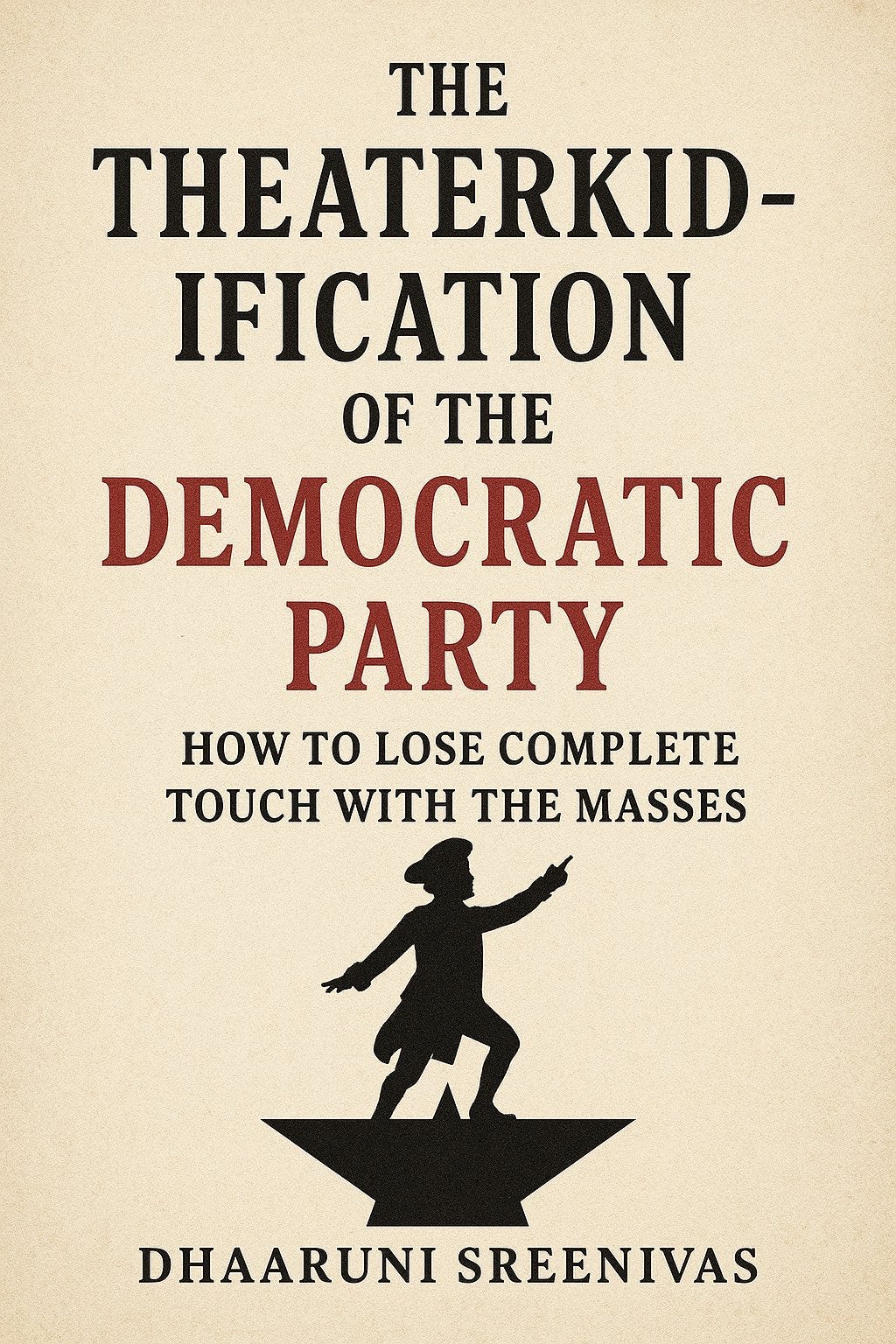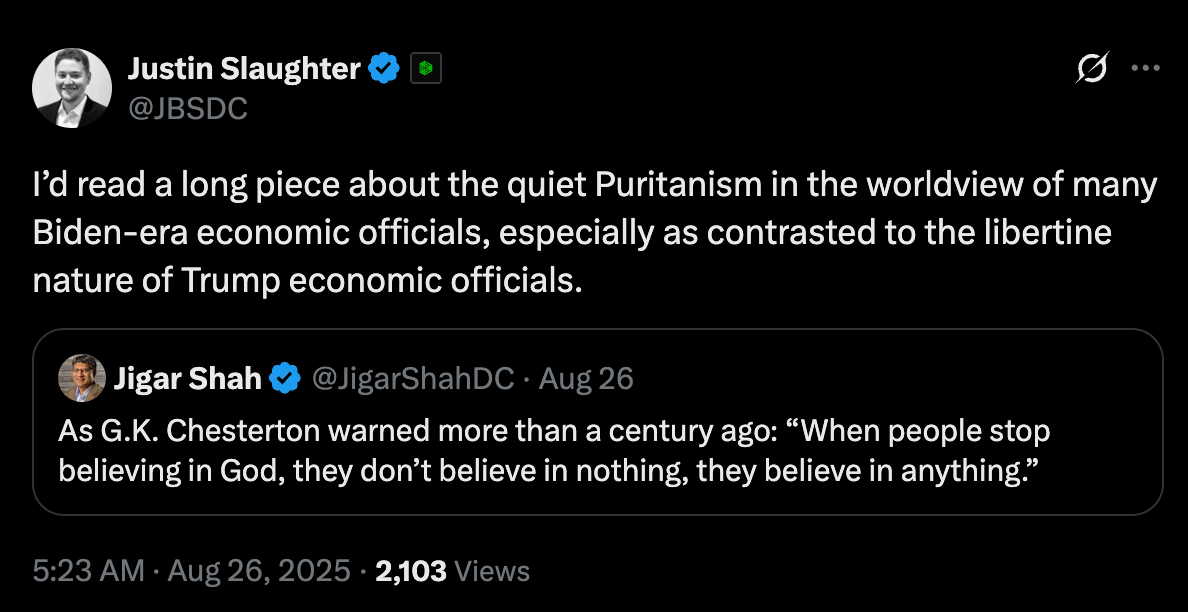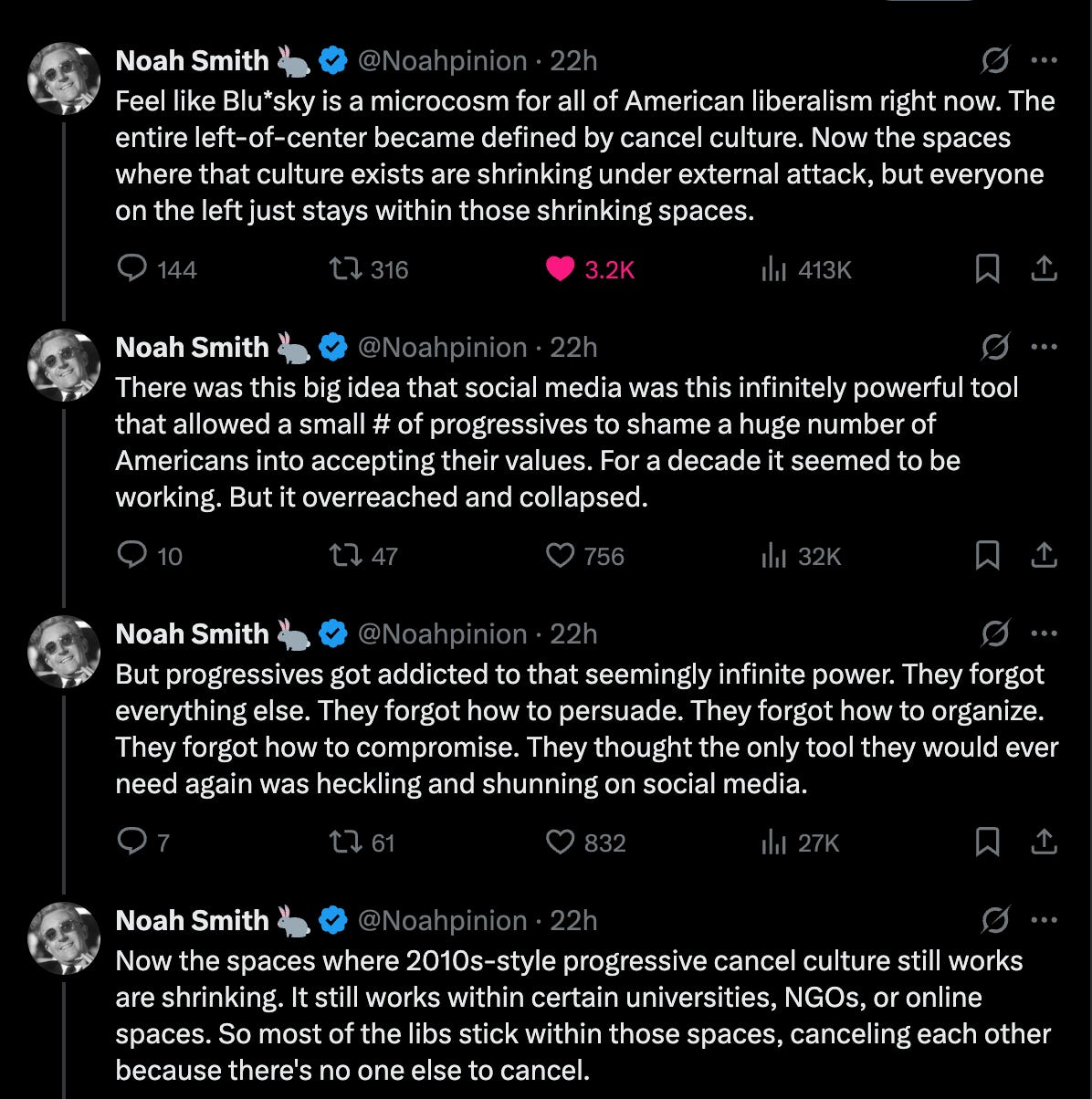Theater Kids and Playing Risk
Yesterday, I went viral for the following tweet1:
Apparently, this post caused a buzz in Democratic group chats (which I’m not in for many reasons) so I decided to explain my thought process.
At first, I was thinking about why there weren’t many female Democratic strategists slash consultants slash pundits. In other word, I don’t know who can be the next James Carville or David Axelrod, and that struck me as odd given that the party is almost 60% female. Then I remembered that we live in a sexist society: men can get away with being interpersonal degenerates2 and dressing like schlubs, but women in the public eye generally have to be (in no particular order):
Conventionally attractive (and well-dressed)
Squeaky clean personal life
Extremely good at their work
However, any woman that meets all three of these criteria is, more often than not, Tracy Flick in Election (1999), the character that no female politician can avoid being compared to, no matter how charming and soft and unpretentious they may attempt to be.
Tracy Flick is an academic overachiever, smart and driven, a real go-getter, but so fixated on being liked by teachers and other adults and getting metaphorical gold stars on every aspect of her existence that she almost forgets, in order to become class president, she needs to be liked by her peers. Sound familiar?
But, the Tracy Flick Problem isn’t unique to women in Democratic politics3, it’s now the perception of the entire party, from the grassroots on up.
In 1992, after three straight terms of Republican governance, Bill Clinton (and his wife) resurrected the Democratic Party. The Third Way was brash and bold, lewd and crude, and powered through the 1990s, ending with a budget surplus. Clinton administration ushered in the Dot-Com Boom and the new millennium, but fell to George W. Bush and the Religious Right by 537 votes in the state of Florida (which just so happened to be governed by Jeb Bush, brother of W, funny how that works).
After 8 years of Bush, a deeply unpopular war, looming economic recession, and the destruction of the city of New Orleans, the country was looking for hope, and Barack Obama was elected the 44th president of the United States. Along with him, Obama brought along a new generation of Democrats, who were committed to social progress and change and well, groping cardboard cutouts of Hillary Clinton. He won reelection in 2012, but like Bill Clinton before him, left office to a Republican administration, that of Donald Trump.
After Trump won the 2016 election, and education polarization began to really sink in, the Democratic Party become ideologically dominated by college-educated liberals, whose mentality then permeated throughout the entire staffer class4, and became the perception of the party at large even if large numbers of voters without a college degree still vote for Democrats.
Being a Democrat, professionally and amateurly, is not and never really has been a lucrative endeavor, so the people who engage with and work with the party are true believers: They genuinely think that they’re making the world a better place, and are willing to pay their dues. Young Republicans can rise quickly through the ranks and often end up cashing out early to make the big bucks on K Street, but young Democrats have to start at the bottom, bide their time, and at the end of the line, may be rewarded, not generally with large sums money or even electoral victories, but with the validation of their moral righteousness. Therein lies the problem.
The general perception of the Democratic party is that we’re hyper-sensitive, attuned to all forms of injustice, both real and fake, and extremely risk-averse to the point of dweebishness5. But, we are also (allegedly) avid cheerleaders for crime and homelessness, and gleefully endorse the upending the social order of the country at large through open borders and drag queen story hour (or whatever).6 We embody the worst of all possible identities. In other words, we became the party of people who wouldn’t dare use a fake ID, even if we knew where to procure one, and now, we are reaping what we sowed7.
However, my evaluation of how the Democratic party is perceived is not exactly universally accepted among liberals.
Here’s the thing: Maybe I would be happier as a Republican due to my temperament (finding public displays of emotion tedious and embarrassing for everybody involved), and approach to life (“Do not complain, work harder, spend more time alone”8), but I strongly believe that Republican policies are by and large, extremely harmful to the American people so Democrats are stuck with me, tough luck!
My finding land acknowledgements annoying and pointless doesn’t make me support the party of launching insurrections, stripping away healthcare for the poorest people in the country, and forcing preteens to have rape babies. However, that doesn’t stop other Americans from voting on how annoyed they get by candidates and political parties, or rather, what they perceive candidates and political parties represent.9
This is my unequivocal stance on the Democratic Party10.
Unfortunately for Democrats, a lot of people dislike annoying people more than dangerous people, and are extremely annoyed by do-gooders for genuinely believing they’re morally superior to everyone else.
Yesterday, my friend and colleague, Justin Slaughter posted this, and it made something click inside my brain.
I’m an atheist to the extent of being borderline religious about it, so naturally, I was disinclined to be a Republican for that reason if nothing else. However, a side effect of Democrats veering away from the cheerful libertinism and promise of youth of the Clinton and Obama administrations and towards the (intended) return to normalcy of the era’s standard bearer, Joe Biden, a devout Catholic, is that the Democratic Party became more subliminally and outrightly religious and in turn, moralizing since at the end of the day, what is religion besides a formal dictate of social mores?
The Religious Right which propelled George W. Bush to two terms in the White House still votes Republican, but the people who made Donald Trump president twice are not traditional Republicans. While Mitt Romney won 51% of college-educated voters in 2012, Donald Trump won 41% of college-educated voters in 2024. Trump’s voter base is less white,11 it’s poorer (despite his economic policies still primarily benefiting the wealthy), and it’s less socially conservative than the Republican Party of 2004, or even 2012. Amber Rose, a former stripper and sex worker, spoke at the Republican National Convention in 2024, several states Trump won by double digits voted to enshrine abortion rights into their state constitutions, and Trump himself might fear God, but he isn’t exactly devout about it, and say what you will about Romney or Paul Ryan or George W. Bush, but they are genuinely religious men.
In any case, partly due to education polarization (college-educated voters are generally less interpersonally messy than non-college voters) and Biden becoming the Democratic Party’s standard bearer, the party became more ostensibly fixated on virtue, and signaling it to anybody who was paying attention, and unfortunately, people were. The thing is, while the party became more moralizing, it didn’t become more socially conservative, and there is little to no public appeal for religious progressiveness.
I’m a woman of color and was a national delegate for Kamala Harris to the Democratic National Convention in 2024 so I feel comfortable saying this outright: The infamous White Women for Harris calls were filled with progressive Christian women (Mallory McMorrow, Glennon Doyle, etc.) whose lifeblood is self-flagellation. They’re Exvangelicals (former Evangelicals) and hicklibs; they genuinely mean it when they say that trans children are children of God. And for better or worse, despite the United States’ official motto being “In God We Trust”, Americans seem to like the idea of God and signaling of religiosity far more than the subsequent follow through.
Lucky for me who can’t stand the associated rhetoric, virtue signaling is about as American as not turning on the AC in the dog days of summer12. The Religious Right lost the culture war: The (Dixie) Chicks are still around and crop tops will never go out of style, and its progressive counterpart isn’t long for this world either.
Earlier this week, Noah Smith post this thread about Bluesky and cancel culture.
It’s all elementary game theory. In a culture where shame is the referee, players have three options:
Follow the rules, say the right thing, receive a payoff for your efforts, social validation of moral superiority (or better)
Try to follow the rules, say the wrong thing, pay the price, social censure (or worse)
Opt out of the entire game, risking total ruin or being rewarded with total Nirvana
As I said, contemporary liberals are extremely risk-averse, so they never pick #3, but for the good of society, I think they should start.
Unfortunately, I was tinkering around with TweetDelete and the original tweet ended up getting deleted before I realized I had a task running in the background.
Examples include Bill Clinton’s many affairs (even in the White House), Gavin Newsom sleeping with his best friend’s wife and also dating a teenager as mayor, etc.
I sometimes think that Democratic men are more to blame for the perception of the party than Democratic women are because voters probably think feminists have taken things too far, but they hold men who are perceived to fail at masculinity in a different sort of contempt.
Kamala Harris lost a lot of ground with non-college voters of color, primarily Asian and Hispanic voters, but she still won the majority of them, just by a lot less than Joe Biden and Hillary Clinton.
There’s a lot to be said about sports betting and how the industry is now almost synonymous with the cohort of young men (of all races) that voted for Trump in 2024, but I personally think the “moral panic” about gambling is one of the more legitimate ones because the vast majority of people can’t do it responsibly, least of all disaffected young men without money to spare. I consider myself the opposite of risk-averse, and I steer totally clear of it because I don’t trust myself even with my excess of willpower, and if I don’t, nobody else should either.
I’m not sure what LGBT topic conservatives are mad about right now because it changes daily and I value my sanity too much to look into it.
The Biden-Harris transfer is arguably one of the major sources of cleavage for the contemporary Democratic Party. I personally hated the perfidy, and will never forgive the people responsible for it, but still others are convinced Biden was betrayed.
Thank you to my honorary late Great Aunt Joan Didion for this advice.
And like I’ve said many times, someone that’s to the Left of the Democratic party sitting out an election is a net -1 for the party’s total vote count, but a voter that pulls the lever for Republicans is -1 for Democrats and +1 for Republicans for a net -2, and that sort of damage really adds up when you remember that there are a lot more people to the right of the Democratic Party than there are to its left. That is why Republicans have a higher floor than Democrats do, and subsequently why Democrats have to win a greater percentage of moderates and Independents nationwide to get federal majorities and the presidency.
I am not linking the piece this is from because I don’t like the piece but you can find it pretty easily if you’re so inclined.
Trump 2024 earned the highest percentage of the Latino vote for a Republican in 40 years.
Not at all, like what are we, Europoors?









Moral scold is never a good image. You may win one or two fights (Prohibition?) but the resentment that most people instinctively feel is REAL
Thank you! This analysis is spot on!